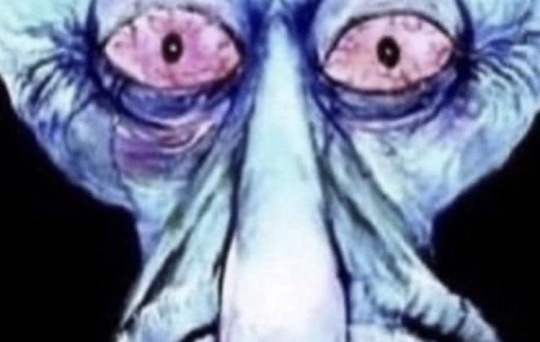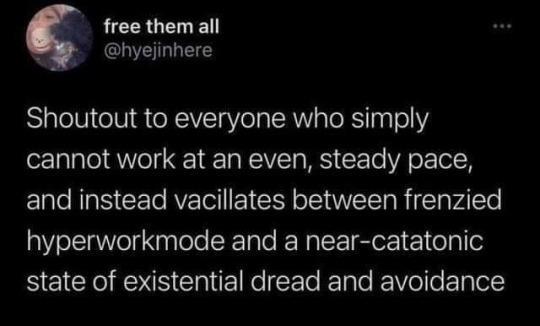Text
I just made soup (I’ve been inspired to make soup)

@melhyan
#avocado#I love her#avocado with cumin lime and salt🤌🏼#gorgeous#magnificent#absolutely fabulous#yes I used ramen as a base but I was very creative with it#soup
2 notes
·
View notes
Text
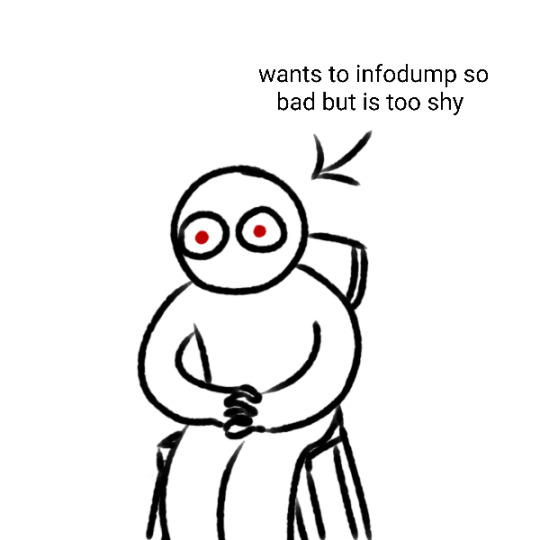
drew a constant mood on the mind
126K notes
·
View notes
Text
My Legacy Inheritor Jaime <3 (2nd Gen.)
Ambitious, Hot Headed, Self Assured, Maker, and family oriented (additional- Street Smart.)
Jaime is no stranger to a good challenge, she spent her teen and young adult life throwing it down in the mud, making a living in underground fighting, all while working a construction job to support herself. To put it simply Jamie’s beat Greg while drunk off of her cousin’s moonshine and felt like she could overcome anything else that came her way. Then she fell in love, she had a kid, and got married.
One day Jaime Helm woke up and realized that she had put her life and ambitions on pause. A few months later Jaime hesitatingly got a divorce, moved out, and became the most recent addition to Waterside Housing, the cheapest housing around (don’t ask why)(not that she really cares to, she takes miracles as they come). Her landlord might be a bit eccentric and her neighbors kind of an odd bunch, but she has a feeling they will grow on her (well, at least a some of them will.)
Nevertheless she’s in her adulthood in a completely unfamiliar place (she’s never left moonwood mill aside from her honeymoon), balancing motherhood, a waitressing gig, and classes (she decided to get her ged and go to college to get a degree in mechanics/engineering). How will Jaime face this new era of her life?
(With a new haircut obv.)
#I made them all bios#they have so much flavor#my sims#she’s literally still on her honeymoon and I’m already planning the divorce#when the side quest became a whole journey#Waterfront Housing Complex; House of Freaks and Criminals#my house of freaks <3#sims 4#sims 4 legacy#show us your sims
3 notes
·
View notes
Text
Say hello to my feral bog child, she is my first ever dnd character 😁 (lv.3)
The crocodile’s main prey in this bog are deer. Juni wears the skull of a stag.
Appearance-
Junebug, or Juni for short, is 14 years old and is no taller than 5ft. She has clammy tanned skin with a slightly green hue and always seems to have condensation on her exposed skin. She has big black eyes that match the color of her hair. Her hair is long and puddles around her when she’s in water. Her teeth are crooked (in a cute way), and her incisors are sharp… almost unnaturally sharp. Her primary weapon is two karambits.
Species - Water Genasi
+1 wisdom
+2 constitution
Acid resistance
Dark vision
Amphibious
Swim = to Walking speed (30ft)
Constitution based spell casting (or wisdom??? (Acid Splash cantrip, shape water cantrip, create or destroy water) 5ewiki and dnd beyond say conflicting things.
Class- Barbarian (path of the wild beast)
When in rage, the bestial power within Juni is revealed. Until the rage ends she takes on the attributes of a crocodile.
Build for Hermit/Outlander Barb-
Learned
Diagnose an Illness, or determine what killed the recently slain (Medicine) Recall lore about gods, religious rituals, and holy symbols.(religion)
Proficiency in Herbalism Kit.
Innate
Notice something that’s easy to miss (perception)
can follow tracks, forage, find a trail, or avoid natural hazards. (Survival)
Custom/Edited Equipment-
Background items
a hunting trap, a trophy from an animal you killed, a herbalism kit, cooking utensils, and a pouch containing 5gp (gold pieces)
Class items
A karambit, another karambit if the dm allows, a rapier, and an explorer’s pack.
*the dm said yes!*
🆒 - Boots of false tracks, Fishing tackle
Eventual Feat- Fighting initiative so that she can pick duel weapon fighting style, then gift of the chromatic dragon 4 acid damage
Questions For The DM:
1. Can we make it a rule that I can only enter barbarian rage after I am hit first. Or that I enter rage when I am dealt a certain amount of damage? Like after I lose a quarter of my health or something? I think that would be fun and add a bit more of a challenge to my combat style bc I would have to rely on my base stats until I could get rage bonuses. Which one of those do you find more interesting 😁?
2. Cån my constitution make it so my character has a really high alcohol tolerance because that would be hilarious if a 14yro could out drink an adult man w/lower constitution.
3. What if Junebug was introduced to the party(specifically the paladin or any lawful adventurers) by fighting them./ they can confuse me with the monster in the swamp terrorizing the town (or like a thief). But like there are things pointing to me not actually being the monster. I think that would be such a cool introduction bc it would impact our character dynamic/relationships but it’s probably something up to the dm
Lore/character details-
1. She was born a human but mutated into a water genasi due to prolonged exposure to the bog.
2. She makes tasty meals as treats for herself after a good hunt/forage and spices up her medicine and remedies. Small comforts y’know. cooking is she picked up out of necessity but became something she enjoys.
3. Juni fights like an animal. She acts like one too, she basically has zero social skills.
4. Juni has spent her entire life in the wilderness of the bog. It has taught her patience and it has taught her to listen, she hears and see things most aren’t still enough to notice. (Perception)
5. More feral than most Juni has learned to rely on her senses, she can expertly navigate the wilderness. (Survival)
6. One of Juni’s parents is a lycanthrope, and she’s inherited some of their curse. (This origin is cool bc it adds some religious flavor to why she was abandoned in a bog, Juni’s animal characteristics could’ve exposed her father’s lycanthropy to the rest of a very religious town, ruining his reputation.)
7. When she’s older she is going to become a priest.
8. Can preform impromptu but more than slightly unorthodox autopsies (medicine is wisdom based not intelligence based 😌😊)
Stats, Weapons, & Damage-
Can lift 128 at current age. 255 as adult
Can drag 255 at current age. 510 as adult
48 Hit Points
Primary
She primarily Duel wields karambits that she made out of crocodile claws.
(2d4 + 2d4)+ 4= 20
*bonus action* (2d4+2d4)= 16
20+16=36 Damage Point Max from Karambits +2 when in rage.
Secondary weapon
Is Rapier that she stole off of dumb noble who ventured into the bog and underestimated its danger. This is her shiniest possession. She doesn’t really find it practical to hunt with, so she mostly uses it to spear fish and roast small things over fires (would use it to toast marshmallows.)
(1d8 +4)= 12+ 2 = 16 when in rage
Natural weapons
1. Claws: 2d6 +4(2) +2 =22 Alt. 1d6 +4 + 2= 12
2. Bite: 1d8 +4 +2=14 If at half hit points when used, you gain health equal to your proficiency bonus.
3. Tail: You grow a lashing, spiny tail, which deals 1d8 piercing damage on a hit and has the reach property. If a creature you can see within 10 feet of you hits you with an attack roll, you can use your reaction to swipe your tail and roll a d8, applying a bonus to your AC equal to the number rolled, potentially causing the attack to miss you.
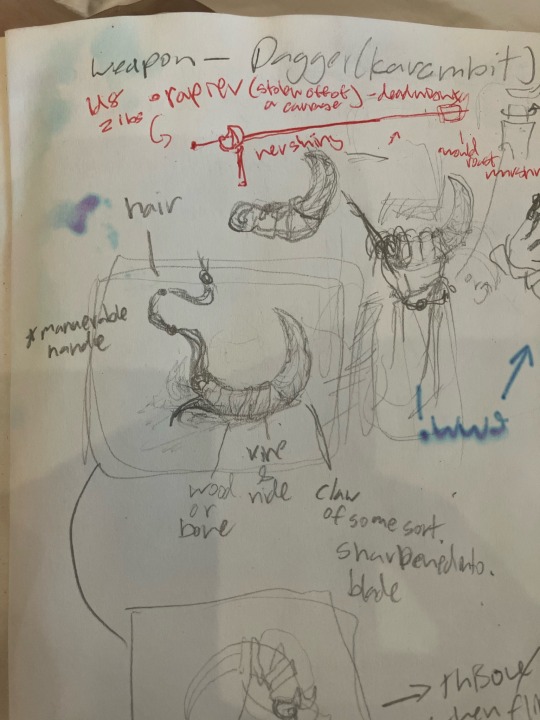

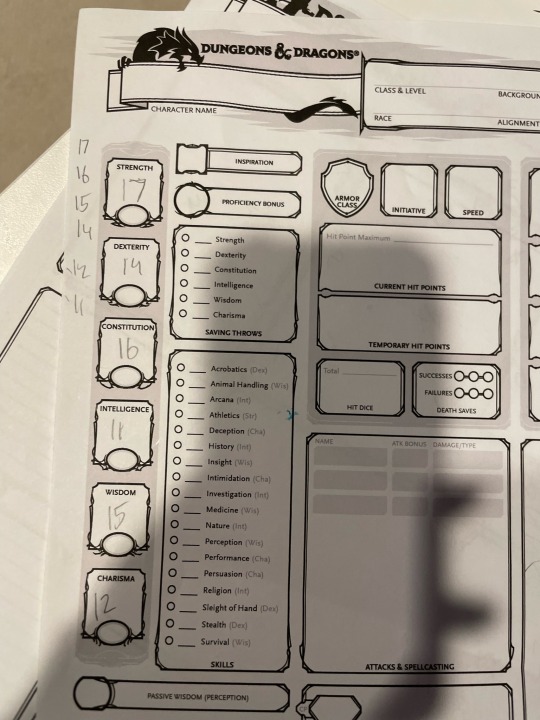
#dnd oc#dnd character#I like bogs#I really like bogs#crocodile#barbarian#input welcome#i need input#wip#art on the way#it’ll come when I remember how to draw
3 notes
·
View notes
Note
In general Ryan gets so mistreated and overhated by the fandom and it makes me sad because I really like Ryan even in my first playthrough :/ I get that the part where he was arguing with Laura about the existence of werewolves when he watched Nick transform and run out the window was kind of dumb but he’s all around a great character who’s brave and helpful and he helped save everyone’s lives in the best ending….
While I don’t agree with all of their actions I can’t bring myself to hate on any of the counselors. They’re all young adults who are stuck in a horrifying and traumatic situation, of course they’re going to be flawed and not perfect. It just baffles me how Travis, Constance, Jedidiah and Eliza do the most horrible things in the game yet people viciously hate on Ryan : (
Oh, the actual adults in the game are absolutely The Worst. (Even Chris, though I think he wants to help, is incredibly negligent at best).
I think there are a few things happening here that can turn people against Ryan (and I'm not saying anyone has to like him as a character, we all have characters we vibe with and ones we don't, but it's worth examining why we don't vibe with some characters especially when those characters are Black or other POC, LGBTQ, and ND-coded).
Ryan is a victim of some of the less compelling writing choices in the game IMO. They don't have anything to do with his character, really, he's generally well-written, but some of the things that were cut from the game, and the way the relationships unravel in the latter half of the game does Ryan kind of dirty.
First of all, his relationship with Chris Hackett isn't fleshed out enough for a lot of players to understand why he's willing to sacrifice so much on the hope that his mentor isn't actually a werewolf (or a deeply irresponsible asshole of a boss). If they'd left in the scene of Chris following up with Ryan about following his dreams and going to animation school and the initial confrontation with Chris that was patched out, where Ryan questions how he hid this from them all this time when he cared about them and Ryan trusted him (literally heartbreaking to watch tbh 🥺), it might have been a little easier for players to empathize with his loyalty to Chris. This kid has no known father, absentee mother, aging grandparents, a sister he clearly feels a lot of responsibility for, and his father figure who he goes to for advice left him in the worst possible situation. Of course he's going to be in denial about that and about him being a werewolf until he sees it for himself, and then Ryan has to kill him. It's so fucking tragic. And he doesn't even get a second to mourn or even react because the Silas plotline kicks in immediately (and they spent all the animated tears budget on Jacob).
Then there's Ryan's relationship with Dylan, which I could (and will) write about for days. Based on the game we got, plus the cut content, I don't think Ryan was ever supposed to have the option to get with Kaitlyn. I think that's a red herring that allows homophobic players to avoid a gay kiss (kind of a fucked up use of a BAMF character and Brenda Song's star power but, ok). I don't think he was ever supposed to get to romance Laura either. But I do think he was meant to be able to either end up with Dylan, or decisively not end up with him. If they'd kept the relationship system that we still have traces of but no actual structure for, then his ability to say 'maybe neither' to Laura wouldn't be something players held against him because it would have a basis in the choices we've made as Ryan (and Dylan) so far. As it stands, it feels like that is unsupported by what's happened in the game when we've had Dylan and Ryan flirting with each other and taking an obvious interest in each other since they were introduced.
Even if you choose the less favorable dialogue options, Dylan and Ryan are never really shown to be truly at odds (with the possible exception of the gun argument, but even that pretty much smooths over in the end). Even if you have them be hard-headed assholes to each other, they still have their heart-to-heart on the way to the radio hut (which I really think was supposed to have an alternative if they had low relationship stats).
Complicating matters is the fact that a lot of people really love Dylan. Obviously I'm one of them, I mean, look at my url and writing choices. I think Miles gives the best performance of the game, hands down (and I think all the actors did really well tbh). He's a great actor (his line reads are flawless and that sassy boy body language? I die.) but he also gets a lot to work with in terms of the script. Dylan is complex and compelling in a way that tends to be highly relatable for most people. He's probably neurodivergent (ADHD) but it's portrayed in a more palatable way for neurotypical people. Plus, as an audience, we are primed to empathize with the person who wants to be wanted, who is afraid of rejection, who has the cute crush that we want to see reciprocated and is trying not to get their heart stomped on. We've all been there! That's a centuries-old trope in drama and literature for a reason. And while Ryan does not owe Dylan reciprocation, we see some pretty clear signs of it at least being possible. So the game sort of dangles it in front of players like we can make that happen with our choices and then makes a half-baked attempt to snatch it away. That annoys people and, I think at least partially because Ryan's race and stoic demeanor (/autism) have people subconsciously primed to view him negatively, they take that out on him instead of the SMG writers who opted for that rather than fleshing out the relationships any further for the latter half of the game.
Like, yes, it's a horror game not a dating sim (Ryan and Dylan dating sim DLC when tho??), but you spend so much time building relationships that end up not mattering to the outcome of the game, I get why that's frustrating for people. It's frustrating for me! I just think being mad at Ryan over it is the wrong take. I still see people saying "Dylan deserves better than Ryan." Dylan and Ryan both deserve to exist in a finished fucking game where we have the option to get them together or not, but blaming whatever happens, or doesn't, on Ryan as a character is kinda trash.
45 notes
·
View notes
Text
Okay folks strap in. Sejanus Plinth is not naïve, and he does not blindly trust Coryo. He does understand what he's saying when he speaks out against the games.
I have a few reasons for thinking this way.
One: Sejanus is a smart kid. He not only grasps the situations that he's put into, but he also shows very clearly that he can extrapolate important information from them, and then use it to think critically of the systems in place. Just about everyone recognizes that killing kids is wrong. Many of the people of the capitol themselves in this era recognize that it's a morally incorrect action to take. However. They are also willing to put that morality aside in favor of what they believe is a justification which makes it right. They are taught-- especially Sejanus's class-- that it is a necessary punishment in order to restore fairness after a period of uncertainty, danger, and unfairness (after all, it is unfair that citizens suffered from a war enacted by a small few in power). In addition, many of Sejanus's classmates were, like him, eight or younger when the war ended. The only thing they remember from the war was how it affected them, and reasonably so, given that they were children. They were then taught, from early development, that they were wronged. And they have no reason to doubt that; after all, the war did hurt them.
Unlike the other children in his class, however, Sejanus recognizes the one fact that he has a particular proclivity, being district-born, to recognize: The war was not fought by the district children like him, like Marcus. It was fought by the adults who, conveniently, are left out of the reach of the games. He draws on the things that he has learned, especially as someone with a foot in both the districts and the capitol, in order to come to a conclusion about what is happening in front of them, to them, and to the people around them.
Sejanus's perspective is never revealed to us, given the point of view of the book, and so, for an outsider, like Snow-- someone solely capitol-born and severely indoctrinated-- all he and others believe is that Sejanus is upset that children are being killed. And that's part of it. But Sejanus is also upset because he recognizes the bigger picture, and he calls it out: “You've no right to starve people, to punish them for no reason. No right to take away their life and freedom. Those are things everyone is born with, and they're not yours for the taking. Winning a war doesn't give you that right. Having more weapons doesn't give you that right. Being from the Capitol doesn't give you that right. Nothing does.”
Notice that he isn't just talking about the games, there. He is talking about the bigger picture: that the victor of a war is enacting its power post-war in a way that compromises the freedom and rights that every individual is not only deserving of, but entitled to.
Keep track of this belief of Sejanus's-- it's going to come into play a lot here. The most important thing to remember is that with this belief, it follows that Sejanus would also believe that we, human being to human being, have a right to secure these rights not just for ourselves, but for everyone around us, too. Simply put: Sejanus believes that we have a duty to help each other. This is seen when he brings food to Marcus, then asks Snow to help him, expecting that Snow will help Lucy Gray, who will help the other tributes, which could inspire others to help the tributes as well, and so on, and so forth. A duty to each other.
Two: I touched on it a bit above, but I want to re-iterate it here. Everything that we read in TBOSAS is from Coriolanus Snow's point of view.
And sure, this is obvious, but it's a very important thing to keep in mind when thinking about characters from this book, as well as the story events that take place. We can reasonably assume that Suzanne Collins didn't feed us complete lies about the story, of course, but what we should note always is that everything in the story is told through a filter, and that filter has proven itself to be an unreliable narrator.
We aren't supposed to believe Snow at face value: and neither does Sejanus.
This is most clear in two spots: first, when Sejanus recognizes correctly that Snow is a calculating individual who watches others before interacting with them (for his own gain), and second, when Sejanus lies to Snow (something that is not a one-time occurrence).
Sejanus understands that Coryo cannot always be trusted. The reason that he does, in the end, is that he is still an optimist: he believes that if he provides Snow with enough chances to do the right thing, that eventually, he will. (A duty to each other).
This is because of one overarching point that the book as a whole makes: the book shows us, the readers, the sheer volume of choices that Snow was given that could have kept him from going down the path that he did. He was given countless second chances to do something for the benefit of someone else. He was given countless second chances to not take control over another person's life. He was given countless second chances to care about the people around him.
And he didn't take a single one.
Sejanus's mistake was not trusting Snow. It was not believing that someone selfish could do something selfless. In fact, it wasn't even Sejanus's mistake. He did exactly what he was supposed to do according to his own world view: he didn't try to control Snow's choices for him, and instead, he kept extending mercy after mercy, in the hopes that Coryo would realize that everyone deserves agency, freedom, life, food, and love. (A duty to each other).
It was Coriolanus Snow who continued to choose the wrong choice every time.
(A small addition: there is not a doubt in my mind that Sejanus knows that Snow sold him out).
Three: Speaking of Sejanus being sold out-- let's discuss that pesky thing called consequences.
Sejanus has been given a reputation of being too stupid and naïve to understand that speaking out against the capitol might have consequences.
I disagree-- to an extent.
I think the truth of the matter is far more nuanced. The trouble is, we can't know what Sejanus was thinking, due to the issue raised in point two: that we only see Sej through Snow's eyes.
But now I want to circle back to point one: Sejanus is a critical thinker. We know he is smart. And as addressed in point two: he didn't blindly trust Snow. He hoped, of course, that another person would choose to do the right thing, but that doesn't necessarily correlate with stupidity or an inability to recognize that other people disagree with what he says, and that there might be consequences for that.
However, since I do believe that there is one explanation that could provide some insight into why Sejanus decided to act out, even with all the risks of doing so (aside from the character trait: Good Person TM), I'd like to point it out here:
Sejanus is affluent. Even in 2, it can be assumed that his life was comfortable. He shows marks of someone who's lived comfortably for at least most of their life: a constant supply of food, to the point that there's excess, squirreled away money, the likes of which even Snow is shocked by, and a good education, which the book informs us was paid for at a hefty fee.
Perhaps Sejanus isn't spoiled or ungrateful-- but one thing we can recognize, as a fact, is that he doesn't often face consequences for his actions (his father pays them away). This is covered in the trilogy, when Katniss herself recognizes that the people in twelve cannot afford the luxury of speaking out against the capitol, as they are barely surviving, much less able to fight. She recognizes something that is even true for America today: it would take all of us, at once, to rise up together, or we will be beaten back down by the inability to eat, to rest, to learn. To save up money to fall back on in times of strike.
Sejanus is lucky enough that he is in a position where he can speak out-- and he does. I'm not saying that he has any less of a valid point due to his wealth. It was largely luck that he ended up that way-- the same way that it was random (bad) luck that Snow's fortune was lost.
But we are supposed to think of Sejanus and Coryo as foils. Sejanus is everything that Snow is not: both rich (something that Snow wants to be) and kind (something that Sejanus wants Snow to be).
At the end of the day, the fact is: Sejanus has had a safety net for most of life. And whether he's using it for good or bad intentions, it doesn't take a detective to figure out that he's got it-- which means that I think he knows he has it, for a time. Sejanus knows that whatever trouble he might get into, it probably won't cost him his life. He is using his position of power and affluence in exactly the right way-- until he goes too far and walks over a line that steals the net out from under him. Because, at the end of the day, the more he escalates, the more the capitol must also. The bigger waves that he makes, the harder the retaliation has to be.
The problem is: Sejanus has to make bigger moves, or else nothing will change.
Sejanus likely knew that eventually, the net would go away. He just didn't know when. And he couldn't have known. There are some things that an eighteen-year-old just will not see coming, safety net or not, intelligent or not, determined or not.
The story of a character who is reduced to someone who speaks out against what's wrong in a book simply because we as the audience know that it's wrong is just a morality lesson in disguise. And pardon me for saying so, but I don't think that's what Suzanne Collins had in mind.
However, the story of a boy who knew that he was playing with fire, but decided to purposefully hope ("a lot of hope is dangerous") that everyone else around him would do the right thing in the end (a duty to each other)... That story? That is a story that I buy would come from the same pen that wrote about an uprising which stemmed from that very same belief system.
--
Bonus:
One extra note that I want to make: I can't control whether someone finds Sejanus annoying or not. Everyone is entitled to their feelings on the matter regardless of what I think about it. That said, I would encourage anyone who feels that way to consider why he comes across as one-dimensional, foolish, or annoying at times. Consider what would happen if we got THG from Snow's point of view: do you think that Katniss would not have been given the exact same treatment? A young rebel who doesn't know what game she's playing and so seems childish and reckless? The book is a skewed bias, and that's what makes the story so compelling to me. That's what makes Sejanus so compelling to me. Coryo sees him as stupid, idealistic, and doomed to get himself killed.
It is significant to me, then, that Coriolanus Snow makes that happen by his own hand.
I ask: Was Sejanus doomed to die for his beliefs, or was Coriolanus doomed to kill Sejanus for his?
65 notes
·
View notes
Text
if you watched the ballad of songbirds and snakes and didn’t recognize how it parallels the current. Sorry but you are fucking dense
#I’m talking about Gaza and the depiction of Palestinian people as terrorists and as animals#They are humans and their lives matter just as much as your own#The Black Panthers were also called terrorists#Just saying#is it terrorism if your fighting against an oppressive apartheid? Or is it just resistance.#from the river to the sea palestine will be free#solidarity with palestine#the ballad of songbirds and snakes#Also read Freedom is a Constant Struggle by Angela Davis#or I will come for your first born#You can listen to it on Spotify. It’s narrated by the one and only#Might make a more thorough analysis when I rewatch
2 notes
·
View notes
Text
#Ah#I see#That is what I thought too#Thank you for your input#this will be taken into consideration.#Ween > Peen
3 notes
·
View notes
Text
Coriolanus Snow Is a traitorous rat bastard
I would kill him if he were not pixels.
#I just watched the ballad of songbirds and snakes#I have no context for anything#It’s like Animal Farm y’all#I’m so giddy#fuck cornwall snowington#I feel the hate in my bones#Does he die eventually? Do the hunger games end?#I do not hunger for games#screaming crying throwing up
2 notes
·
View notes
Text
#More than anything I would like to unhinge my jaw like a snake#I would like to bite people more efficiently
16K notes
·
View notes
Text
If the reason I die is because of heat I will be very pissed
freezing to death > heat stroke
#This is not foreshadowing#though I suppose I wouldn’t know if it was#Or I would#That would be unfortunate
2 notes
·
View notes
Text
Look at my silly little socks
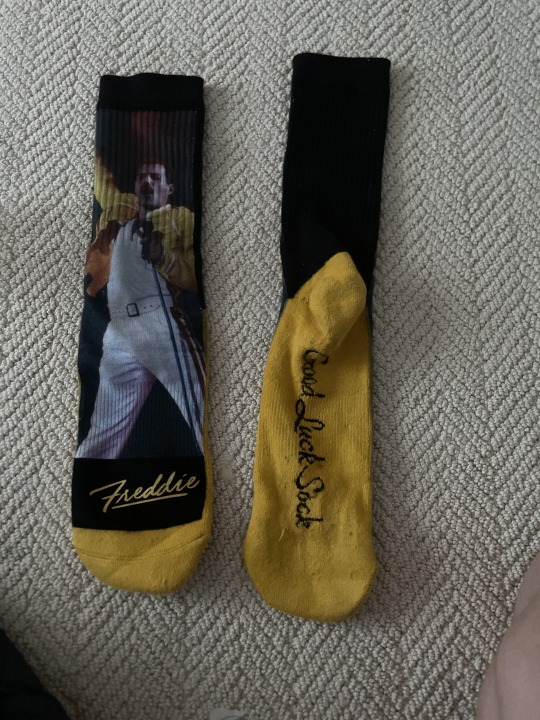
#They are silly#and are also socks#I really like my silly little socks#Is this how you are supposed to use tags?#idrk what im doing#but I’m finding it amusing
1 note
·
View note
Text
normal & well-adjusted response of “well if i killed myself i would no longer have mental & physical health issues”
#But also#If I were dead I wouldn’t be able to eat hand sanitizer#Eat hand sanitizer first die later.
110 notes
·
View notes
Text
stop using hospitals as horror settings
#I am saving this for later#more ghost ship horror games cmon#please and thank you#Writing/story/game prompt
189K notes
·
View notes
Text
the autism mood of never knowing when its “your turn” in a convo so you say the first word of your sentence about 5 times before you actually get to speak
97K notes
·
View notes
